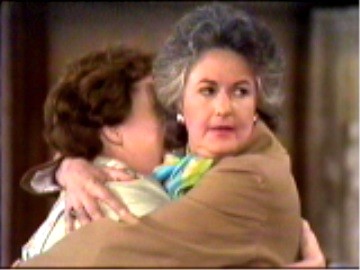
MAUDE, the socially controversial, sometimes radical sitcom featuring a
strong female lead character played by Bea Arthur, ran on CBS from 1972 to
1978. Like its predecessor All in the Family, Maude was created by Norman
Lear's Tandem Productions. Maude Findlay was first introduced as Edith's
liberal, outspoken cousin from suburban Tucahoe, New York on an episode of
All in the Family in 1972 before spinning off later that year to her own
series set in upper middle-class Tucahoe where she lived with her fourth
husband, Walter Findlay, her divorced daughter Carol, and Carol's young son
Phillip. The Findlay's also went through three housekeepers during the run of
the series, the first of whom, Florida Evans, left in 1974 to her own
spin-off, Good Times. These three shows, among others, comprised a cadre of
1970s Norman Lear urban sitcoms that raised social and political issues and
dealt with them in a manner as yet unexplored in television sitcom. Maude
enjoyed a spot in the top ten Nielsen ratings during its first four seasons
despite being subjected to day and/or time changes in the CBS schedule that
continued throughout the entire run of the program.
Like many of Lear's productions, Maude was a character-centered sitcom. Maude
Findlay was opinionated like Archie Bunker, but her politics and class
position were completely different. Strong-willed, intelligent and
articulate,
In episodes Maude gets a face-lift, Walter's business goes bankrupt, and he
deals with the resulting bout with depression; in yet another Walter
confronts his own alcoholism. The realism of Maude, though conforming to the
constraints of the genre, made it one of the first sitcoms to create a
televisual space where highly charged, topical issues and sometimes tragic
contemporary situations could be discussed.
Maude represented a change in television sitcoms during the early 1970s. Many
1960s sitcoms reflected the context and values of white middle America, where
gender and family roles were fixed and problems encountered in the program
rarely reached beyond the confines of nuclear family relationships. Despite
variations on that theme in terms of alternative families (Family Affair and
My three Sons) and an added supernatural element (Bewitched and I Dream of
Jeannie), the context was middle to upper-middle class, mostly suburban, and
white. However, cultural upheaval in the 1960s, the political climate of the
early 1970s, shifting viewer demographics and the maturing of television
itself were responsible for a departure from the usual fare. By the early
1970s a growing portion of the viewing audience, baby boomers, were open to
new kinds of television, having come of age during the era of Civil Rights,
Vietnam protests and various forms of consciousness raising. However, the
changing tastes of the audience and the social climate of the early 1970s
cannot by themselves account for the rise of socially conscious television
during this period. The sitcom had also matured and producers like Norman
Lear, familiar generally with American humor and specifically with the rules
of television sitcom, decided to make television comedy that was more
socially aware. Like All in the Family, Maude set out to explode the dominant
values of the white middle-class domestic sitcom with its traditional gender
roles and non-white stereotypes by openly engaging in debates where various
political points of view were embodied in the sitcom characters.
Such debates were the staple of Maude throughout its six-year run. In an
early episode Maude hires Florida Evans, a black woman, to be housekeeper.
Maude goes out of her way to prove her progressive attitude to Florida by
insisting she become like one of the family. Florida, along with Walter and
Carol, points out to Maude the foolishness of her extreme behavior. In the
end Maude recognizes her underlying condescension towards Florida who, as
witty and outspoken as Maude, retains her dignity and decides to remain as
Findlay housekeeper on her own terms. The interaction between Maude and
Florida in this episode was a comment on the issues and attitudes about race
that stemmed from the Civil Rights efforts of the 1960s. Maude's attitudes
and behavior were indicative of white liberal politics during a time when
race relations in the United States were being reconfigured.

Another reconfiguration was taking place within the arena of women's rights.
In one of the final episodes of the show, Maude is given the opportunity to
run for New York state senate and Walter refuses to consider the possibility.
He offers Maude an ultimatum, and after mulling over her decision, she
decides to let Walter leave. This episode,
like many others, reflected a
feminist sensibility emerging within the country, and can be viewed as a
platform for discussions about the changing roles of women and the
difficulties they encountered as they were faced with new challenges and more
choices. Maude's character agonized over the conflict between tradition and
her own career aspirations. |



